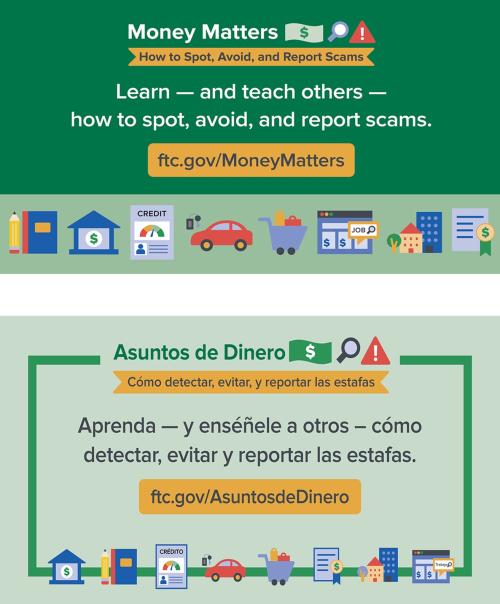It’s right up there with eating more vegetables and hitting the gym. A top New Year’s resolution for many Americans is keeping a closer eye on their personal finances – a goal more important than ever, given the economic impact of the pandemic. Chances are you know someone who is searching for a job, looking for a place to live, applying for a loan, or facing another consequential dollars-and-cents decision. Help them spot, avoid, and report financial scams by sharing free multimedia resources available at FTC.gov/MoneyMatters, also available in Spanish at ftc.gov/AsuntosDeDinero.
Money Matters features articles, videos, social media shareables, and sample presentations that focus on eight primary areas:
- Credit Reports
- Buying or Renting a Home
- Avoiding a Scam When Looking for a Job
- Borrowing and Debt
- Education and Training
- Your Rights When Shopping
- Buying and Owning a Car
- Prizes and Grants

Why those topics? They all relate to significant financial decisions – and as people work to regain their financial footing, they all are areas where consumers have been injured by deceptive practices or outright fraud.
FTC Bureau of Consumer Protection Director Sam Levine introduced Money Matters in a recent Consumer Alert. Business executives can play an important role in spreading the word to employees, friends, and family about what scammers are up to. When people learn about scams from folks they trust, they’re less likely to lose money to fraud. So if a relative is house hunting, Money Matters’ Buying or Renting a Home can help them avoid potential pitfalls. Or maybe you know a former colleague rejoining the workforce. Avoiding a Scam When You’re Looking for a Job can help them spot forms of fraud that target job seekers. The students in your family – including people thinking about heading back to school – will appreciate advice on How Student Loans Work and How To Avoid Scams.
Here are four more ways business people can use Money Matters resources.
Introduce your HR team to Money Matters. Encourage your in-house “people people” to share Money Matters publications with your staff. Reprint scam warnings in your staff newsletter. Spring for some snacks and sponsor an educational coffee break.
Use your platform as a community leader. Maybe you’re active in a state or local business group. At meetings and conferences, distribute materials available at no charge from the FTC. Perhaps you volunteer with a charity, at your kid’s school, or at your place of worship. Next time you’re called on to “say a few words,” Money Matters has some suggested words and easy-to-adapt presentations.
Share resources on social media. Money Matters features graphics and videos designed for social media. You’re also welcome to link to any FTC consumer materials or business publications from your website, blog, or social media account.
Let people know we want to hear their story. If an employee, friend, or relative has been injured by a scam, encourage them to report their experience to the FTC. We also welcome your reports about questionable practices you've spotted, including B2B scams that have a particular impact on small businesses.
Watch this video for more information.

Thanks you
It's really nice to read and very informative. So much thanks for the sharing. I was looking for that and this is very important for me. Thanks